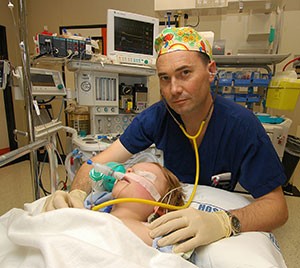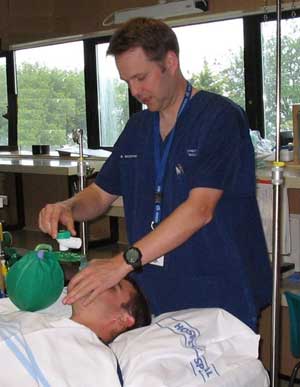Anaesthetist
Tasks & duties

Anaesthetists may do some or all of the following:
-
assess the patient's medical status and how that might affect the anaesthetic
-
assess the patient's pain management requirements before surgical operations
-
talk to other medical specialists about the treatments and procedures before, during and after an operation
-
discuss the anaesthetic process with the patient
-
decide on the anaesthetic drugs and techniques to be used before, during and after an operation
-
give local and general anaesthetics to patients
-
continually monitor the patient's vital signs, such as heart rate, blood pressure, body temperature and breathing during surgery
-
observe and care for the patient before, during and after their operation and undertake measures to counteract adverse reactions or complications
-
record details of drugs given
-
resuscitate critically ill people such as trauma victims
-
teach medical staff and students about anaesthetics
-
carry out research on new drugs and treatments
Specialisations
Anaesthetists can work in:
-
clinical anaesthesia
-
intensive care medicine
-
pain medicine and related areas such as hyperbaric medicine (therapy that uses pure oxygen)
Skills & knowledge

Anaesthetists need to have:
-
knowledge of medicines and treatments and the effect these have on patients
-
understanding of the effects of anaesthetics and other drugs on the body, and how to treat allergic reactions
-
knowledge of different diseases and illnesses
-
knowledge of anatomy and how the human body works
-
communication and people skills to relate well to patients and colleagues
-
the ability to use anaesthetic monitoring equipment
-
an awareness and understanding of other cultures and their attitudes to medical treatment
-
knowledge of medical ethics and law
-
skill in reviving and resuscitating people
-
crisis management skills
-
diagnostic skills
-
decision-making and problem-solving skills
-
organisational and time management skills
-
analytical and interpreting skills
-
up-to-date knowledge of new research, treatments and practices
-
report writing skills
Entry requirements
To become an anaesthetist you need to complete a Bachelor of Medicine and Bachelor of Surgery (MBChB) and spend at least two years as a junior house surgeon in a hospital. You must then complete another six to seven years of specialist training and examinations to become a Fellow of the Australian and New Zealand College of Anaesthetists (ANZCA).
Secondary education
To enter tertiary training you need to have Bursary or NCEA equivalent. Useful subjects include maths with calculus and/or statistics, chemistry, physics, biology and English.
Training on the job
Anaesthetists take part in continuing education courses through the Australian and New Zealand College of Anaesthetists, which has a Maintenance of Professional Standards (MOPS) programme in place. The college also runs an Annual Scientific Meeting (ASM), regular workshops and other professional development activities to keep anaesthetists up to date with new research and technology.
Registration
Anaesthetists need to be a Fellow of the Australian and New Zealand College of Anaesthetists and have vocational registration with the Medical Council of New Zealand.
Useful experience
Useful experience for an anaesthetist includes work with the Red Cross, St John's Ambulance or in hospitals. Any other health-related work or work involving contact with other people can also be helpful.
Related courses
Anaesthesiology
General Medicine
Human Biology
Medical Science
For more information, please refer to Career Services.
Document Actions
